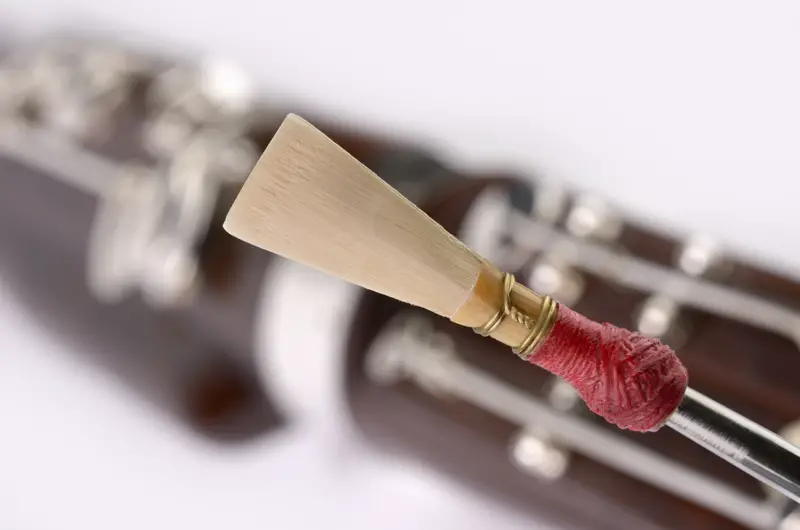Woodwind instruments, such as the oboe, clarinet, or bassoon, use reeds made of cane. The reeds are mounted to the mouthpiece of the instrument using wires. The vibration of the reed is what creates the instrument’s sound. Specialized care and use will determine how long a bassoon reed will last.
Most bassoon reeds will last on average about 2-3 months. Bassoon players should always own multiple reeds so that they can rotate their reeds and reduce damage, thereby lengthening the life expectancy of their reeds.
There are many things that affect how long a bassoon reed will last. Bassoon players should learn the techniques that will change the strength of their reeds. Having the appropriate kind of reed and understanding reed care is essential for increasing the life of your bassoon reed.
How to Extend the Life of Your Bassoon Reed
 Bassoon reeds can become quite costly depending on the type you are using and how often you are using the reed. It is possible to extend the life of your bassoon reed through proper care and storage. Some things to keep in mind to ensure that your bassoon reed lasts as long as possible include:
Bassoon reeds can become quite costly depending on the type you are using and how often you are using the reed. It is possible to extend the life of your bassoon reed through proper care and storage. Some things to keep in mind to ensure that your bassoon reed lasts as long as possible include:
- Use a reed case: Purchasing and using a bassoon reed case, like the Pro Tec Bassoon Reed Case, are much better for your reeds than the plastic case provided with purchase. A great bassoon reed case will include ventilation holes to allow your reeds to fully dry after use.
- Clean your bassoon reeds properly: Bassoon reeds can break down from the acid in your saliva when not properly cleaned. Unclean bassoon reeds might also develop mold, mildew or excess bacterial growth.
- Rotate your bassoon reeds: Using multiple reeds will allow them to rest between uses and cleaning. It will also ensure that you do not overuse or break-in your bassoon reed too quickly. This is particularly important to avoid with new reeds.
- Soak your reed before use: Soaking your bassoon reed before each use will prevent the reed from drying out. Use lukewarm water and soak the reed for a few minutes while you are assembling your bassoon.
How Do You Clean a Bassoon Reed?
Reed cleaning is important to ensure your bassoon reed will last as long as possible. Each person will have their own reed cleaning routine and will want to adjust based on their usage and type of reeds. Some tips to make sure your reed is being properly cleaned each time include:
- Use fresh water: Using fresh water each time you soak your reed will help prevent mold and bacteria from growing on your reed. Never consume your reed water as it may contain remnants of mold from your reed.
- Rinse: Rinsing your bassoon reed in clean water after each use will clear away the acid from your saliva and prevent breakage. This can be done by running the reed through fresh water to remove the saliva build up.
- Cleaning solution: Using a well balanced cleaning solution will ensure your reed gets fully clean. Mix one part water with one part hydrogen peroxide and a dash of mouthwash. Soak your reed in this solution every one to two weeks.
How Much Do Bassoon Reeds Cost?
The cost of a bassoon reed depends on the:
- Manufacturer
- Style
- Material
- Strength
 It is possible to find a bassoon reed for $10.00, but the average cost of a bassoon reed will be around $20.00. If you are a serious bassoon player, however, you will want to invest more in your reed. Some examples of bassoon reeds include:
It is possible to find a bassoon reed for $10.00, but the average cost of a bassoon reed will be around $20.00. If you are a serious bassoon player, however, you will want to invest more in your reed. Some examples of bassoon reeds include:
- Budget Bassoon Reed: If you are looking for an affordable bassoon reed and are not concerned about the material or durability, you can find one around $10-$12 like the Eastar ERD-BSms Bassoon Reed.
- Bulk Bassoon Reeds: It is a good idea to have multiple reeds on hand at all times. If you like a specific bassoon reed, you are able to purchase sets of multiples, such as the Geesatis 5 PCS Bassoon Reeds set that’s around $26 for 5 double reeds.
- Average Bassoon Reed: An average double bassoon reed, such as the Richards RDR-1203 Bassoon Double Reed, will cost around $20.
- Synthetic Bassoon Reed: Synthetic bassoon reeds are non-traditional but are considered more sustainable. A synthetic reed, like the Legere Bassoon Reed, will cost much more than an average reed at around $140.
| Type of Bassoon Reed | Cost | Link for More Info |
|---|---|---|
| Budget Bassoon Reed | $10-$12 each | View on Amazon |
| Bulk Bassoon Reeds | About $5 each | View on Amazon |
| Average Bassoon Reed | $15-$20 each | View on Amazon |
| Synthetic Bassoon Reed | Around $140 | View on Amazon |
Common Bassoon Reed Issues and Solutions
 There are some issues that all reeds are susceptible to. It is important to not only know these but be able to deal with and solve these issues.
There are some issues that all reeds are susceptible to. It is important to not only know these but be able to deal with and solve these issues.
- Leaking: If your reed is leaking, consider the fit of the reed. If there are cracks in your bassoon reed, you can use beeswax and a small screwdriver to fill the cracks.
- Fit: If your reed doesn’t fit into your mouthpiece, you can purchase a reed reamer, like the Reed123 Reamer, to carefully and delicately adjust the fit of your reed.
- Wires: Be sure your reed is well wetted to make sure that the wires don’t slip. You will need to adjust the wires based on your reed size, which will help if your reed is too big or too small. Adjusting the wires around the tip might also affect the sound.
- Strength: A reed that is too strong will be hard to blow and should be gently sanded. A weak reed can be fixed by adjusting the first wire using a reed clipper like the Reed123 Bassoon Pliers.
- Wetting: Do not wet your reed using your saliva. A dry reed will cause a honking sound, which can be avoided by properly wetting your reed with warm water for a few minutes before use.
How to Get the Best Performance from Your Bassoon Reed
There are many ways to avoid common issues with your bassoon reed. Understanding how the reed functions, and the actions that will harm your reed are important. There are some essential things to avoid in order to get the most from your reed and to extend the life of your favorite reeds.
Avoid:
- Dropping your reed
- Over soaking your reed
- Storing wet reeds
- Storing all your reeds in one location
- Leaving your reed on the instrument when not in use
- Chewing your reed
- Letting your reed become dirty
- Overuse of a reed
Why the Strength of a Bassoon Reed Matters
 Bassoon reeds come in a variety of strengths that affect the sound, quality, and life of the reed. New bassoon players will want to consider the strength of their breath before choosing their reed. If you are still determining which reed is best for you, you try out a variety of reed strengths to see which suits you best. The various bassoon reed strengths include:
Bassoon reeds come in a variety of strengths that affect the sound, quality, and life of the reed. New bassoon players will want to consider the strength of their breath before choosing their reed. If you are still determining which reed is best for you, you try out a variety of reed strengths to see which suits you best. The various bassoon reed strengths include:
- Soft/Medium Soft: Softer reeds are a great choice for beginner bassoon players because they present less resistance.
- Medium: Medium bassoon reeds begin to provide more resistance and are great for new bassoon players with a bit more experience and a stronger breath.
- Medium Hard/Hard: The harder the bassoon reed the more resistance the player will experience. Hard bassoon reeds are suggested only for advanced bassoon players.
Making your Bassoon Reed Last
Getting to know your specific type of bassoon reed will help increase the life of your reed. The less time your reed is in contact with saliva, and the more it is able to rest between uses, the better for the health of your reed. Be sure to follow a proper cleaning schedule, rotate your reeds, and use a proper reed case for maximum quality of life of your reed.
We included quite a few links in this article, so I have them listed below again for your convenience. Happy playing!


